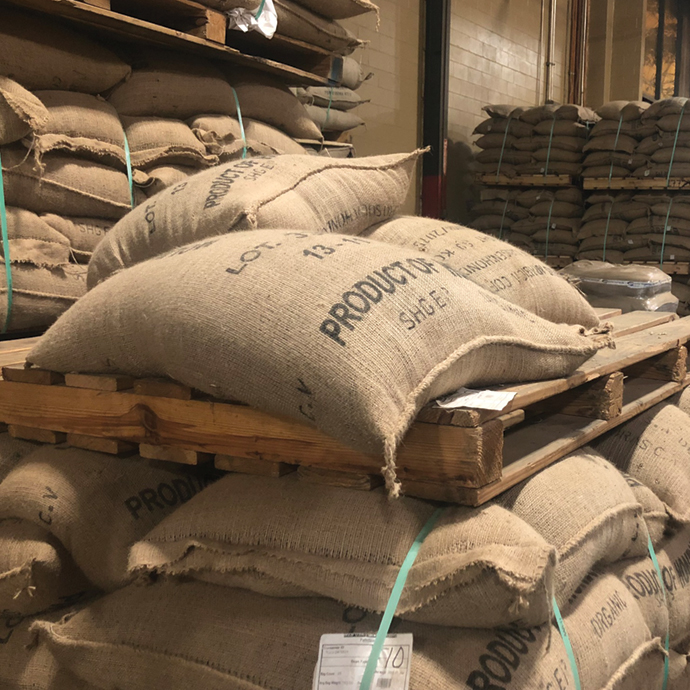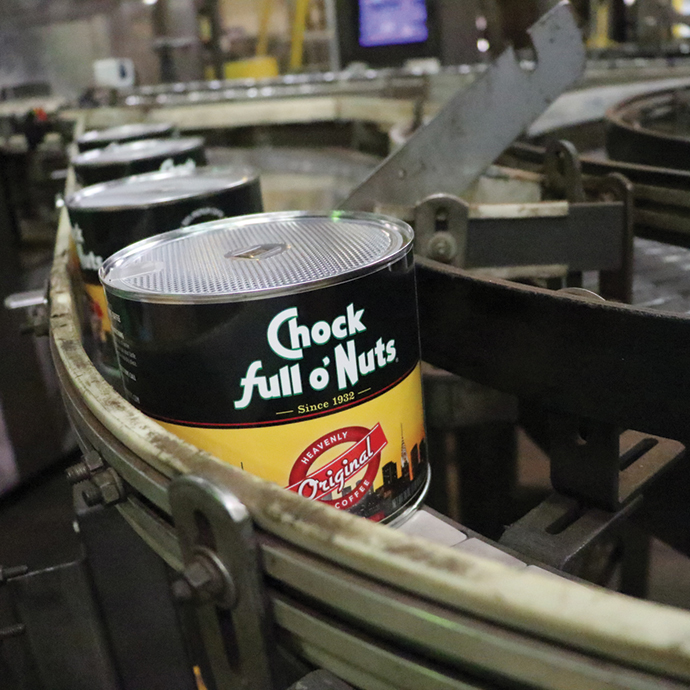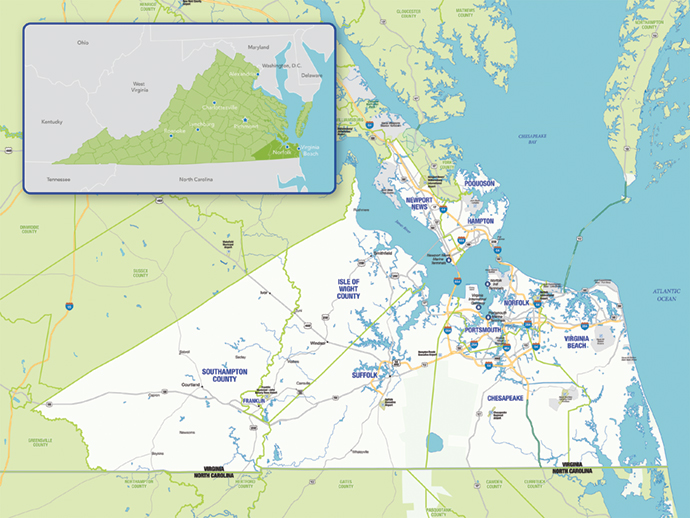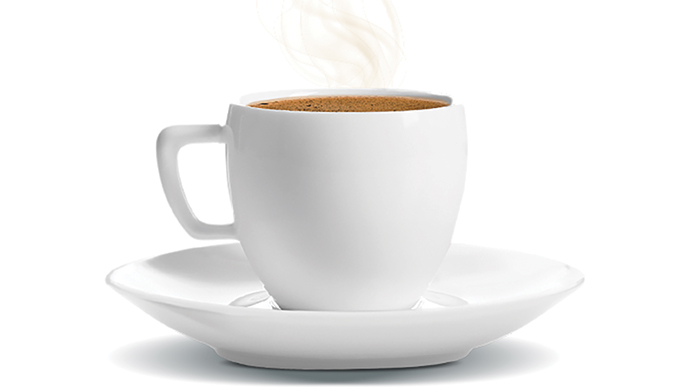Food can spark our most powerful memories. Generations of good experiences in coastal Virginia continue to spark investments by global food and beverage companies. Many of them even got their start right there in Hampton Roads, the region of southeastern Virginia officially known as the Virginia Beach-Norfolk-Newport News metro area.
J.S. Darling & Sons Oyster Packers was founded in 1881 in Hampton. McMenamin Crab Co. founder James McMenamin invented and patented the modern process of canning and sealing meats in air-tight containers in the 1870s and gave Hampton its “Crab Town” nickname. Today the tradition is carried on by L.D. Amory Company and Graham & Rollins Inc. Nearby, Wanchese Fish Company, headquartered in Suffolk, is one of the world’s largest harvesters, processors and distributors of Atlantic seafood.
Amedeo Obici founded Planters in Suffolk in 1913, helping the city, home to Mr. Peanut, become the peanut capital of the world. Even as the company continues churning out products, its legacy includes Obici Healthcare Foundation, a major regional presence today with the mission to improve the health status of residents of Suffolk and the surrounding communities.


Joseph Luter in 1936 founded Smithfield Packing, now a part of Smithfield Foods, in Isle of Wight County, cementing the area’s reputation as the Ham Capital of the World. Hubbard Peanut Company, maker of the famous Hubs Virginia Peanuts, until recently had been run out of the family home in Sedley, Virginia, where Dorothy Hubbard pioneered the commercialized process of “home cooked peanuts” using a water blanching and oil roasting process in the 1950s. The company recently purchased a former grocery store building in Franklin that will offer customers a new retail experience and capabilities for shipping the highest quality peanuts all around the world. The company is adding 10 jobs to its staff of 40, and is Virginia’s oldest continuously family owned and operated peanut processor.
These founding fathers and mothers of food and beverage (F&B) have made their mark around the world at the same time they’ve established deep roots in the region around seafood, peanuts and pork, among other foods. Hampton Roads is a big reason why 150 F&B processing companies have chosen to locate or expand in Virginia over the past decade, creating over 7,300 new jobs and making capital investments totaling $2.3 billion. Virginia’s F&B companies employ more than 42,000, account for 17% of total manufacturing employment in the commonwealth and have fostered 15% employment growth over the past five years.
Global Connections
The range of Hampton Roads F&B operations is deep, wide and global — from local delicacies to Hampton-based FDA compliance firm Registrar. A robust roster of tea and coffee operations from the likes of Unilever (producer of every Lipton tea bag in North America at its Suffolk facility), Massimo Zanetti and J.M Smucker (maker of Folger’s) have given Suffolk the moniker “Caffeine Capital of America.”
Massimo Zanetti (MZB-USA) sells 120,000 tons of coffee annually around the world. The company’s 20 brands include Hills Bros., Kauai Coffee and Chock full o’Nuts. Today MZB-USA’s portfolio in Hampton Roads includes a corporate headquarters, a roasting operation in Suffolk and a new East Coast distribution center the company announced in June 2020, to be located in Virginia Port Logistics Park in Suffolk.
“This facility will position us for greater efficiency and continued growth, add to the economic vitality of the area, and bring great people to Suffolk — along with some of the best coffee on earth,” said MZB-USA Senior Vice President of Supply Chain Doug Nesmith of the move from a smaller facility in the region.
MZB-USA employs around 400 in the region. Helping make the labor equation work is Hampton Roads’ status as the second largest metro area on the East Coast between the nation’s capital and Atlanta, with a labor force of more than 800,000 and more than 96,000 students from the region’s eight universities and four community colleges.
Road and rail help too, with CSX and Norfolk Southern serving the commonwealth along with an improving network of highways. But it’s the Port of Virginia that looms largest, with a deep, ice-free harbor that’s soon going to be even deeper and wider: After securing federal funds in 2018, a project from the Port and the U.S. Army Corps of Engineers will deepen the Chesapeake Bay’s Thimble Shoal Channel from its current 50 feet to 56 feet, the inner harbor to 55 feet and the Atlantic Ocean Channel to 59 feet.
More than 1.7 million sq. ft. of cold storage space is either already in place or planned within a 20-mile radius of the Port, which moved half a million TEUs in October and November 2020, setting a record. It is the second largest coffee port on the East Coast and, among other accomplishments, is Italy’s No. 1 single largest export destination.
Another company from southern Europe is also growing in Suffolk, as 180-year-old Spanish olive oil manufacturer Acesur in early 2020 committed to invest $11 million and employ 29 at its first U.S production operation in Suffolk Industrial Park.
The project is receiving support from the Hampton Roads Alliance and incentives from the Virginia Economic Development Partnership, the City of Suffolk and the Port of Virginia. The facility will handle the company’s bulk oil imports from Argentina, Australia, and Spain.
“Virginia was chosen due to its market proximity, progressive infrastructure investment, as well as the Port of Virginia’s proximity to the plant,” said Joseph Fairchild, vice president of operations and director of purchasing for Acesur USA LLC.
Eating and Drinking Local for 200 Years
Chris Morello, director, Isle of Wight County Economic Development, leads a team offering full support to growing companies like Smithfield Foods, which today employs around 3,000 at its HQ and production operations in the county. The history behind the company goes back nearly two centuries to the settlers who captured wild hogs in the area, and then learned to breed them for production, giving the region a reputation for its cured hams.
Today Smithfield employs around 50,000 worldwide. But its ties to its home territory run deep.
“They are incredibly engaged in the community in many ways,” Morello says.
So is Keurig Dr Pepper (KDP), whose expanding operation kicks out 43 million K-Cups a week from a site at Shirley T. Holland Intermodal Park, 26 miles from the Port of Virginia and the Portsmouth Terminal. Morello’s organization and the Hampton Roads Alliance have offered full support to KDP too. The company is also getting an assist from a new electrical technology certification program at Paul D. Camp Community College that will support KDP production operations.

Morello is hot on the trail to attract more F&B investment to the park. “We have a lot of growth potential for food and beverage,” he says.
Distillery Could Complete the Circle
The past and the future are living and breathing in Virginia Beach too, where the first and only distillery in a working hotel in the United States has opened to rave reviews at The Historic Cavalier Hotel. It’s part of a national trend of brewpubs and distilleries that’s strong in Virginia, where 290 independent breweries rank the state No. 12 nationally.
The history of the Prohibition-era hotel, which has hosted nine U.S. presidents and many times that number of rumors, led co-founder Andrew Yancey, his partner Josh Canada and their partner Bruce Thompson, CEO and founder of Gold Key Resorts and Professional Hospitality Resource and a fellow area native, to give the place a name befitting the legend: Tarnished Truth Distillery.
To help design the space as well as make the product, Yancey brought in master distiller Larry Ebersold, who, like Yancey, knew how successful the “Bourbon Trail” has been in Kentucky.
“You can smell the mash and really get into it,” says Yancey, who grew up half a mile from his distillery. “We put together an amazing distillery, with a renovation in a building that’s almost 100 years old, so we couldn’t move any columns or walls. Now it’s the number one thing to do in Virginia Beach on Tripadvisor. We’re also the number one distillery store out of 150 in Virginia.”
That’s thanks in part to a pandemic-driven change in the state’s ABC liquor store regulations that allows breweries and distilleries to sell via e-commerce — a channel supported by the region’s extensive and improving road and rail infrastructure.
Long term, Yancey says, they might need to invest in new, freestanding production sites for a popular line of canned cocktails and for the spirits, including the distillery’s signature Old Cavalier Bourbon Cream.
“There is scalability,” he says.
Thus an entrepreneurial hospitality venture may circle back to the Hampton Roads legacy of food and drink production going back centuries.
Yancey likes the economic momentum he sees evolving in his town and the whole region. “Hampton Roads has an opportunity,” he says.
It’s an intoxicating prospect.
This Investment Profile was prepared under the auspices of the Hampton Roads Alliance, the regional economic development organization representing 11 localities in a remarkable region centrally located on the U.S. East Coast. For more information, visit hamptonroadsalliance.com.

